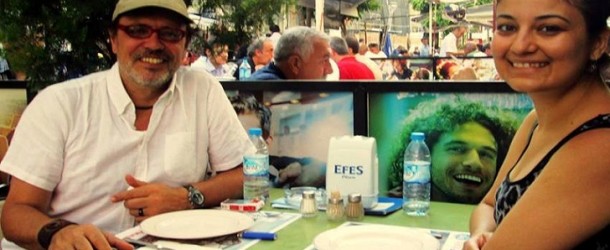Ayşe Yarar: Mr. Moreira, firstly I want to thank you for accepting UPA’s interview proposal. Could you please give us some information about your academic life?
Carlos Moreira: You are welcome; it is a pleasure for me. I am a political scientist, PhD in Political Science from the FLACSO (Latin American School of Social Sciences) in Mexico and I am working as a Professor and a researcher at Autonomous University of Baja California in Mexico.
Ayşe Yarar: Mr. Moreira, you have been in Turkey and observed some social events and Turkish society. What do you think about Turkish people and Turkey?
Carlos Moreira: I have not been here for a long time. I have been in Turkey just for a touristic travel. But my first impression is that Turkey is a very complex and fascinating country. On the other hand, Turkish people are so friendly and hospitable. I have realized that there are many similarities between Latin America and Turkey in terms of social aspects. For example party systems, social structure and modernization and democratization efforts of Turkey are some of the similarities with Latin American countries. Also there are some historical and cultural issues that are completely different in Latin America and Turkey. I think it would be very interesting to make comparative researches about Turkey and Latin American countries about these topics.
Ayşe Yarar: Mr. Moreira, what is your opinion about the ruling Justice and Development Party and Turkey’s Prime Minister Recep Tayyip Erdoğan?
Carlos Moreira: The political situation in Turkey can be understood under the concept of Electoral Authoritarianism by Andreas Schedler. In such a system, there is a country with electoral system but political power as elected rulers govern the country in an autocratic way.
Ayşe Yarar: Mr. Moreira, how can you evaluate Gezi Protests in Turkey?
Carlos Moreira: I think these protests will help to improve the quality of democracy in Turkey.
Ayşe Yarar: Mr. Moreira, if you compare Turkey and Mexico in terms of democratic conditions, what can you tell us?
Carlos Moreira: I find that there are great similarities. Because Mexican and Turkish democracies are a little bit fragile and they might be transform to hybrid or authoritarian systems. The elected officials may tend to subvert democracy, and civil society should be alert to these processes.
Ayşe Yarar: Mr. Moreira, how is the perception about Turkey and Turkish people in Mexico?
Carlos Moreira: The knowledge we have about Turkey is very limited except recent protests.
Ayşe Yarar: Mr. Moreira, what can you say about economic and political relations between Turkey and Mexico?
Carlos Moreira: In a globalized world, of course there are relations between these countries. But the degree of economic and political relations is not too much.
Ayşe Yarar: Mr. Moreira, Mexico is known as a developing economic power in Latin America. How is the current economic situation in Mexico now?
Carlos Moreira: Mexico has dealt with the effects of the crisis happened in 2008 and 2009. Also economic growth of Mexico is similar to or higher than Brazil which is another major economic power in the region. As an oil exporting country, Mexico has more advantages than the other countries to overcome the economic problems.
Ayşe Yarar: Mexico and the USA are neighboring states. Professor Moreira, what can you tell us about their current relations?
Carlos Moreira: The USA has a great economic impact on Mexico, and also political influence in some way. The major topics of the relations between two countries are drug trafficking (including arms trafficking) and the immigration of Mexicans and other nationalities to the United States. These are the issues that need urgent solutions.
Ayşe Yarar: Mr. Moreira, could you give us the names of Turkish scholars, authors, journalist or any person who are well known in Mexico?
Carlos Moreira: As I said before, the knowledge we have about Turkey is little. Certainly, we know about Atatürk, a great statesman whose historical role presents similarities with Lazaro Cardenas in México.
Ayşe Yarar: Mr. Moreira, thank you very much for sharing your opinions with UPA. Good luck in your studies.
Interview: Ayşe YARAR

























































